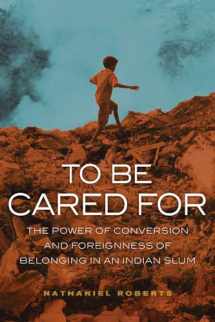
To Be Cared For: The Power of Conversion and Foreignness of Belonging in an Indian Slum (Volume 20) (The Anthropology of Christianity)
ISBN-13:
9780520288829
ISBN-10:
0520288823
Edition:
First Edition
Author:
Nathaniel Roberts
Publication date:
2016
Publisher:
University of California Press
Format:
Paperback
312 pages
Category:
Protestantism
,
Christian Books & Bibles
FREE US shipping
Book details
ISBN-13:
9780520288829
ISBN-10:
0520288823
Edition:
First Edition
Author:
Nathaniel Roberts
Publication date:
2016
Publisher:
University of California Press
Format:
Paperback
312 pages
Category:
Protestantism
,
Christian Books & Bibles
Summary
To Be Cared For: The Power of Conversion and Foreignness of Belonging in an Indian Slum (Volume 20) (The Anthropology of Christianity) (ISBN-13: 9780520288829 and ISBN-10: 0520288823), written by authors
Nathaniel Roberts, was published by University of California Press in 2016.
With an overall rating of 3.6 stars, it's a notable title among other
Protestantism
(Christian Books & Bibles) books. You can easily purchase or rent To Be Cared For: The Power of Conversion and Foreignness of Belonging in an Indian Slum (Volume 20) (The Anthropology of Christianity) (Paperback, Used) from BooksRun,
along with many other new and used
Protestantism
books
and textbooks.
And, if you're looking to sell your copy, our current buyback offer is $1.09.
Description
To Be Cared For offers a unique view into the conceptual and moral world of slum-bound Dalits (“untouchables”) in the South Indian city of Chennai. Focusing on the decision by many women to embrace locally specific forms of Pentecostal Christianity, Nathaniel Roberts challenges dominant anthropological understandings of religion as a matter of culture and identity, as well as Indian nationalist narratives of Christianity as a “foreign” ideology that disrupts local communities. Far from being a divisive force, conversion integrates the slum community—Christians and Hindus alike—by addressing hidden moral fault lines that subtly pit residents against one another in a national context that renders Dalits outsiders in their own land."
Read an interview with the author on the Association for Asian Studies' #AsiaNow blog.
Read an interview with the author on the Association for Asian Studies' #AsiaNow blog.


We would LOVE it if you could help us and other readers by reviewing the book
Book review

Congratulations! We have received your book review.
{user}
{createdAt}
by {truncated_author}


